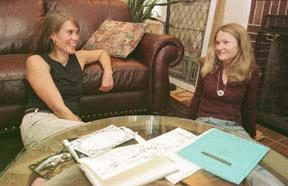When terrorist attacks blew the world apart, two Port Madison women responded by bringing their own community together.
“The world has to narrow to a neighborhood before it can broaden into brotherhood,” said Sara Faulkner, who with Nancy Blakey started the effort among north-end residents.
“The recent events made us decide it was time to rebuild our community.”
After the Sept. 11 terroist attacks on America, Faulkner and Blakey sent out flyers to 92 homes in the Port Madison area, inviting residents to a potluck supper on the beach. The response surpassed their wildest expectations – more than 200 people turned up.
“People were talking about it as gourmet potluck,” said Reba Ferguson, one of the first neighbors to get on board, along with Margaret Seed. “It was as if everyone who brought food wanted to feed the world.”
Asked to bring their spare change to donate to the World Trade Center relief effort, the neighbors emptied their pockets. When all the coins were counted – by hand at Wells Fargo to save the 6 percent fee the change-sorter machine extracts – the tally exceeded $1,400.
The neighborhood children and young people contributed their thoughts on the events across the continent in the form of a scrapbook, which will be sent to one of the fire stations in New York City closest to ground zero.
“There was a table set up where the kids could do artwork,” Blakey said. “They brought poetry and art.”
Some of the youngsters made Tibetan prayer flags, which now hang above the Port Madison entry marker at the corner of Euclid and Washington avenues.
“You write a thought on the flag and the prayer goes out on the wind,” Faulkner said. “You’re supposed to leave the flag up until the wind tears them apart.”
Perhaps even more important than what they did for others, though, was what the neighbors did for themselves.
It began with a big circle, in which everyone had the opportunity to say a few words.
“Everyone introduced themselves,” Blakey said, “and everyone else started making a mental map of the neighborhood.”
After the introduction, each neighbor put his or her candle in the center of the circle, and Blakey’s son played a bagpipe dirge to end the ceremony.
It was over, but nobody went home.
“We had to close up because people got so busy talking and catching up,” Blakey said.
One tangible legacy of the event will be a community resource network, something the women have been contemplating for some time.
“The idea is to prepare a network that can be activated in case of events that need a community response,” Faulkner said.
The idea first came up prior to the Y2K fears, Faulkner said, when some warned of possible long power outages that could endanger the elderly. The plan resurfaced after the Feb. 28 earthquake, when there were concerns about who might look after children whose parents were working in Seattle.
“We wanted to find out what skills there are in the neighborhood, from chopping wood to counseling to medical help to who has a boat to go to Seattle if the ferries aren’t running,” said Faulkner, herself a doctor.
The women are preparing a resource map and directory, which they hope to distribute to every area home within two weeks.
“Hopefully, people will put it next to their telephone directory, and get comfortable using it,” Faulkner said.
And neighborhood get-togethers will be more frequent.
“We want to keep this going and have it become an annual event,” Faulkner said, noting that another neighbor has offered the family home for a holiday party.
Blakey, a writer, says the experience will be the basis for a short book that she hopes will prompt other neighborhoods on and off the island to engage in their own community-building activities.
“When you have a need in the community, it just takes a few sparks to make it happen,” she said.
“I hope more communities just do it – if they wait for the right time or the right place, it will never come about.”



